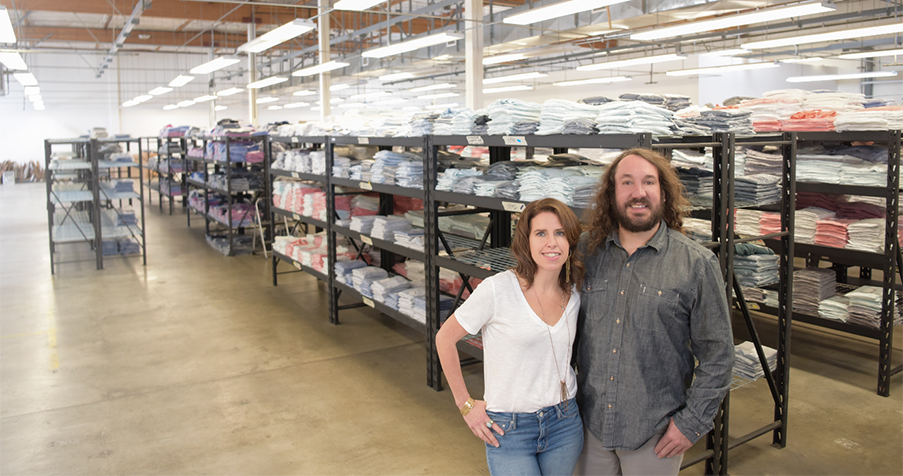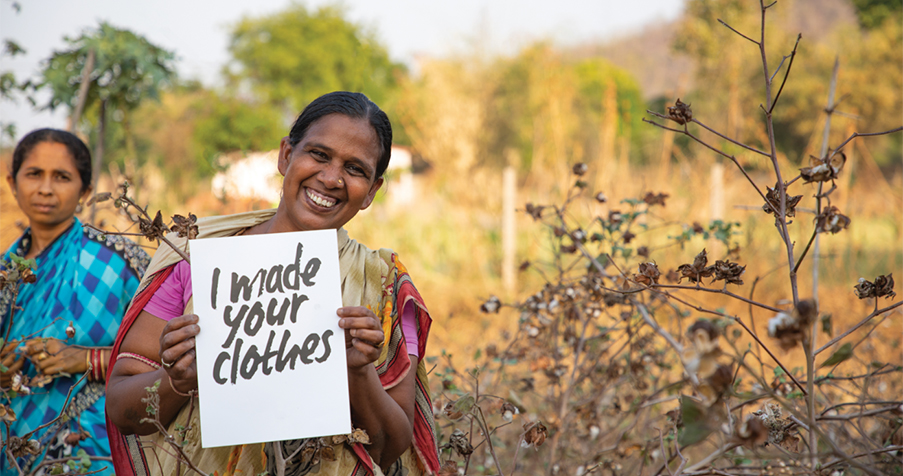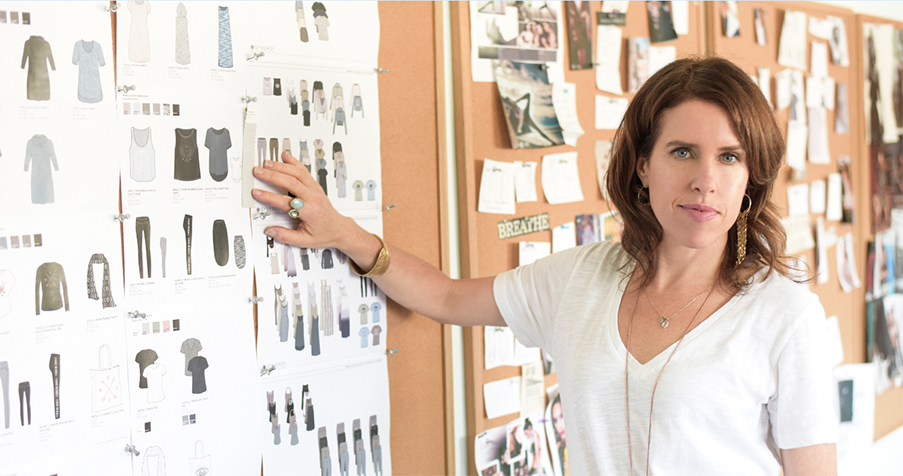Fair Trade Clothing Company Grows Fast and Well
Aug 30 2018
When Kate Fisher and Henry Schwab, the owners of Synergy Organic Clothing, received their first order from Whole Foods Market in 2014, they were thrilled. The husband-and-wife team had sold their organic cotton clothing in their three retail stores and at festival booths nationwide for years, all the while aspiring to a bigger stage. So when the natural foods retailer placed an order, Fisher and Schwab jumped at the opportunity. The only glitch: they had no idea how they’d finance the increased production.
Whole Foods stepped in and lent Synergy $600,000—at the time, the largest loan ever given from the market’s Local Producer Loan Program. When Whole Foods upped its order from $400,000 in 2016 to more than $4 million the following year, Synergy once again had to scramble for funding. That’s when Whole Foods reached out to RSF Social Finance for help.

Kate Fisher and Henry Schwab, owners of Synergy Organic Clothing in the enterprise’s Santa Cruz, CA warehouse.
“Synergy was growing very quickly and wanted to make sure they took on the right kind of capital,” says Kate Danaher, senior director of integrated capital at RSF. “We wanted to work with them because they care about the planet, their community, and their employees. They are a company that wants to do it right.”
Synergy starts with a human connection
“Synergy was growing very quickly and wanted to make sure they took on the right kind of capital to grow fast and well.”—Kate Danaher, senior director of integrated capital at RSF
Fisher founded the clothing company in 1993, when she was on her first trip to Nepal. She was 21, on leave from her anthropology and religious studies at Evergreen State College, and had fallen in love with the textiles of Southeast Asia.
She loved the people even more. “I remember buying an antique Tibetan wool jacket from a Nepalese man and thinking, ‘Wow, I came from thousands of miles away, and this man is so different from me, but we’re sharing this human connection of buying and selling.’ It was this archetypal relationship of being a merchant.”
Fisher soon started designing her own clothing using material from antique Indian saris. She liked the eco aspects of using recycled fabric. When organic cotton appeared on the market around 2006, she embraced it quickly. By that time, she had married Schwab, and the two officially formed Synergy Organic Clothing.

Workers on Synergy’s organic cotton farm in Orissa, India.
Leading the way in conscious clothing
Synergy is now a leader in the organic apparel industry. The Santa Cruz, California–based company is Global Organic Textile Standard (GOTS) certified and meets the highest standards for organic fiber. The company is conscious of impact throughout its supply chain, from its growing fields in India to its low-impact dyeing process to its recycled packaging on the shelves of Whole Foods.
This is in stark contrast to the world of conventional cotton, which accounts for 16 percent of the world’s insecticide use, more than any other single crop.
Synergy is also Fair Trade-certified, and all its garments are sewn by adults in India and Nepal who are paid a living wage.
Fisher continues to design the clothing, favoring a style that is classic, comfortable, and modern. “I taught myself how to work with clothing design,” says Fisher. “I do it in my own intuitive way, thinking about the kind of clothing I like to wear and what I think the marketplace needs.”

Several designs from Synergy’s current collection.
Scrambling to fund rapid growth
Fisher clearly reads the marketplace well. Synergy’s sales expanded from $120,000 in the early 2000s to $2.8 million in 2016. In 2017, that number exploded to $6.4 million. “My job for the last three, four, or five years, every day, is trying to get loans,” says Schwab. “It’s all I do, and it’s the hardest thing to do.”
It’s a particularly challenging job because of the apparel business’s timeline. Synergy has to pay its manufacturers in India and Nepal 220 days before the company’s clothing appears in stores, leaving a long gap between expenses and income. Many clothing companies tackle this problem by securing purchase order financing, but, says RSF’s Danaher, “that can be fairly predatory and risky.”
Synergy received one $500,000 loan through the Small Business Administration (SBA) and tried to secure others through banks. “But you can’t show a traditional bank purchase orders as collateral,” says Schwab. “The only thing you can show them is what you did in the past.” Because Synergy has grown so rapidly, its financial history does not come close to matching its current capital needs.
Fisher and Schwab were excited by RSF’s willingness to take a more creative approach. Although RSF does not provide purchase order financing because of the risks involved—there’s no guarantee that a purchaser will buy everything it ordered—the lender approached Whole Foods on Synergy’s behalf.
“We asked if Whole Foods was willing to guarantee those purchase orders and buy Synergy’s clothing so that we could get paid,” says Danaher. Whole Foods gave the guarantee. In March 2017, RSF lent Synergy $1.5 million. Soon after, RSF also assumed Synergy’s SBA loan.
Gaining breathing room for expansion
“Without RSF’s involvement, it’s possible that we wouldn’t be in business today.”—Henry Schwab, co-owner of Synergy Organic Clothing
“Without RSF’s involvement,” says Schwab, “it’s possible we wouldn’t be in business today.” RSF’s loan allowed Synergy to meet demands on its e-commerce site and in Whole Foods stores throughout North America (the clothing company has shuttered its own brick-and-mortar stores.) Synergy started working with REI in 2017, and received a significantly larger order from the outdoor retailer in 2018. Fisher and Schwab hope to expand into major department stores soon.
“RSF has given us the breathing room to design and produce our products for the next nine to 18 months while we figure out our future source of financing,” says Schwab. “They’ve reached out and started discussing what our plans should be moving forward and what they can do to help. That’s great because everyone looks to us as one of the leaders in the organic clothing industry now. So there’s lots of room for growth.”